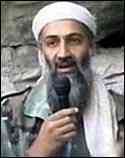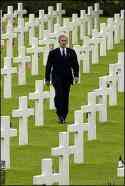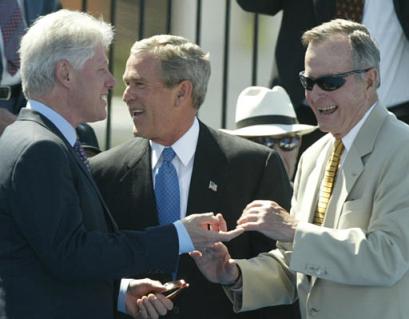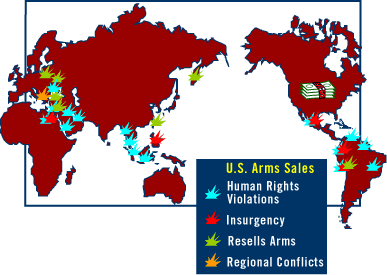|
for a more researched article try: The lost War drill ? (Chapter 6-8)
Bin Ladin's followers conspired to kill US servicemen in Yemen who were on their way to participate in the humanitarian mission "Operation Restore Hope" in Somalia in 1992, and plotted the deaths of 'American and other peacekeepers in Somalia who were there to deliver food to starving Muslim people.' [my italics...]
The rising threat of the Islamic jihad movement was first detected by United States investigators after the 1993 bombing of the World Trade Center. The inquiry into that attack revealed a weakness in the immigration system used by one of the terrorists, but that hole was never plugged, and it was exploited by one of the Sept. 11 hijackers.
no war on terror!
Bin Ladin's network assisted Egyptian terrorists who tried to assassinate Egyptian President Mubarak in 1995 and who have killed dozens of tourists in Egypt in recent years.
The Egyptian Islamic Jihad, one of the key groups in the network, conducted a car bombing against the Egyptian embassy in Pakistan in 1995 that killed over 20 Egyptians and Pakistanis.
Members of bin Ladin's network plotted to blow up US airliners in the Pacific and separately conspired to kill the Pope.
His followers bombed a joint US and Saudi military training mission in Riyadh, Saudi Arabia in 1995.
Bin Ladin's network has publicly and repeatedly articulated a clear and violent anti-US agenda:
no war on terror!
In August 1996, bin Ladin issued a "declaration of war" against the United States.
click on map above
In 1996, a State Department dossier spelled out Mr. bin Laden's operation and his anti-American intentions. And President Bill Clinton's own pollster told him the public would rally behind a war on terrorism. But none was declared.
By 1997, the threat of an Islamic attack on America was so well recognized that an F.B.I. agent warned of it in a public speech. But that same year, a strategy for tightening airline security, proposed by a vice- presidential panel, was largely ignored.
"From 1993 to 1997, the U.S. government sold, approved, or gave away $190 billion in weapons to virtually every nation on earth. "
Egyptian Letter Bombs, January 2-13, 1997:
A series of letter bombs with Alexandria, Egypt, postmarks
were discovered at Al-Hayat newspaper bureaus in Washington,
New York City, London, and Riyadh, Saudi Arabia. Three
similar devices, also postmarked in Egypt, were found at a
prison facility in Leavenworth, Kansas. Bomb disposal experts
defused all the devices, but one detonated at the Al-Hayat
office in London, injuring two security guards and causing
minor damage.
Tajik Hostage Abductions, February 4-17, 1997:
Near Komsomolabad, Tajikistan, a paramilitary group led by
Bakhrom Sodirov abducted four United Nations military observers.
The victims included two Swiss, one Austrian, one Ukrainian, and
their Tajik interpreter. The kidnappers demanded safe passage for
their supporters from Afghanistan to Tajikistan. In four separate
incidents occurring between Dushanbe and Garm, Bakhrom Sodirov and
his group kidnapped two International Committee for the Red Cross
members, four Russian journalists and their Tajik driver, four UNHCR
members, and the Tajik Security Minister, Saidamir Zukhurov.
Venezuelan Abduction, February 14, 1997:
Six armed Colombian guerrillas kidnapped a U.S. oil engineer and his
Venezuelan pilot in Apure, Venezuela. The kidnappers released the
Venezuelan pilot on February 22. According to authorities, the FARC
is responsible for the kidnapping.
Empire State Building Sniper Attack, February 23, 1997:
A Palestinian gunman opened fire on tourists at an observation deck
atop the Empire State Building in New York City, killing a Danish
national and wounding visitors from the United States, Argentina,
Switzerland, and France before turning the gun on himself. A
handwritten note carried by the gunman claimed this was a punishment
attack against the "enemies of Palestine."
no war on terror!
ELN Kidnapping, February 24, 1997:
National Liberation Army (ELN) guerrillas kidnapped a U.S. citizen
employed by a Las Vegas gold corporation who was scouting a gold
mining operation in Colombia. The ELN demanded a ransom of $2.5
million.
FARC Kidnapping, March 7, 1997:
FARC guerrillas kidnapped a U.S. mining employee and his Colombian
colleague who were searching for gold in Colombia. On November 16,
the rebels released the two hostages after receiving a $50,000 ransom.
Hotel Nacional Bombing, July 12, 1997:
A bomb exploded at the Hotel Nacional in Havana, injuring three persons
and causing minor damage. A previously unknown group calling itself the
Military Liberation Union claimed responsibility.
Israeli Shopping Mall Bombing, September 4, 1997:
Three suicide bombers of Hamas detonated bombs in the Ben Yehuda shopping
mall in Jerusalem, killing eight persons, including the bombers, and
wounding nearly 200 others. A dual,U.S./Israeli citizen was among the dead,
and seven U.S. citizens were wounded.
OAS Abductions, October 23, 1997:
In Colombia, ELN rebels kidnapped two foreign members of the Organization
of American States and a Colombian human rights official at a roadblock.
The ELN claimed that the kidnapping was intended "to show the international
community that the elections in Colombia are a farce."
no war on terror!
Yemeni Kidnappings, October 30, 1997:
Al-Sha'if tribesmen kidnapped a U.S. businessman near Sanaa. The tribesmen
sought the release of two fellow tribesmen who were arrested on smuggling
charges and several public works projects they claim the government promised
them. They released the hostage on November 27.
Murder of U.S. Businessmen in Pakistan, November 12, 1997:
Two unidentified gunmen shot to death four U.S. auditors from Union Texas
Petroleum Corporation and their Pakistani driver after they drove away from
the Sheraton Hotel in Karachi. The Islami Inqilabi Council, or Islamic
Revolutionary Council, claimed responsibility in a call to the U.S. Consulate
in Karachi. In a letter to Pakistani newspapers, the Aimal Khufia Action
Committee also claimed responsibility.
Tourist Killings in Egypt, November 17, 1997:
Al-Gama'at al-Islamiyya (IG) gunmen shot and killed 58 tourists and four
Egyptians and wounded 26 others at the Hatshepsut Temple in the Valley of
the Kings near Luxor. Thirty-four Swiss, eight Japanese, five Germans, four
Britons, one French, one Colombian, a dual Bulgarian/British citizen, and
four unidentified persons were among the dead. Twelve Swiss, two Japanese,
two Germans, one French, and nine Egyptians were among the wounded.
In February 1998, bin Ladin stated "If someone can kill an American soldier, it is better than wasting time on other matters."
the bin Ladin network's World Islamic Front for Jihad Against the Jews and Crusaders declared its intention to attack Americans and our allies, including civilians, anywhere in the world.
UN Observer Abductions, February 19, 1998:
Armed supporters of late Georgian President Zviad Gamsakhurdia abducted
four UN military observers from Sweden, Uruguay, and the Czech Republic.
FARC Abduction, March 21-23, 1998:
FARC rebels kidnapped a U.S. citizen in Sabaneta, Colombia. FARC members
also killed three persons, wounded 14, and kidnapped at least 27 others
at a roadblock near Bogota. Four U.S. citizens and one Italian were among
those kidnapped, as well as the acting president of the National Electoral
Council and his wife.
Somali Hostage-takings, April 15, 1998:
Somali militiamen abducted nine Red Cross and Red Crescent workers at an
airstrip north of Mogadishu. The hostages included a U.S. citizen, a German,
a Belgian, a French, a Norwegian, two Swiss, and one Somali. The gunmen
were members of a subclan loyal to Ali Mahdi Mohammed, who controlled the
northern section of the capital.
In May 1998, bin Ladin stated at a press conference in Afghanistan that we would see the results of his threats "in a few
weeks."
IRA Bombing, Banbridge, August 1, 1998:
A 500-pound car bomb planted by the Real IRA exploded outside a shoe store
in Banbridge, North Ireland, injuring 35 persons and damaging at least 200
homes.
U.S. Embassy Bombings in East Africa, August 7, 1998:
A bomb exploded at the rear entrance of the U.S. embassy in Nairobi, Kenya,
killing 12 U.S. citizens, 32 Foreign Service Nationals, and 247 Kenyan
citizens. About 5,000 Kenyans, six U.S. citizens, and 13 FSNs were injured.
The U.S. embassy building sustained extensive structural damage. Almost
simultaneously, a bomb detonated outside the U.S. embassy in Dar es Salaam,
Tanzania, killing seven FSNs and three Tanzanian citizens, and injuring
one U.S. citizen and 76 Tanzanians. The explosion caused major structural
damage to the U.S. embassy facility. The U.S. Government held Usama Bin
Ladin responsible.
no war on terror!
IRA Bombing, Omagh, August 15, 1998:
A 500-pound car bomb planted by the Real IRA exploded outside a local
courthouse in the central shopping district of Omagh, Northern Ireland,
killing 29 persons and injuring over 330.
Colombian Pipeline Bombing, October 18, 1998:
A National Liberation Army planted bomb exploded on the Ocensa pipeline
in Antioquia Department, killing approximately 71 persons and injuring
at least 100 others. The pipeline is jointly owned by the Colombia State
Oil Company Ecopetrol and a consortium, including U.S., French, British,
and Canadian companies.
|
|
A secret intelligence report prepared for President Bill Clinton in December 1998 reported on a suspected plot by Osama bin Laden to hijack a U.S. airliner in an effort to force the United States to release imprisoned conspirators in the 1993 World Trade Center attacks.
The one-page declassified version of the President's Daily Brief dated Dec. 4, 1998, contains chilling information the CIA had gleaned from several sources indicating that al-Qaida was working with U.S.-based operatives of its deadly ally, the Egyptian group Gama at al-Islamiyya, in the purported hijack plot.indystar
|
no war on terror!
Armed Kidnapping in Colombia, November 15, 1998:
Armed assailants followed a U.S. businessman and his family home in
Cundinamarca Department and kidnapped his 11-year-old son after stealing
money, jewelry, one automobile, and two cell phones. The kidnappers
demanded $1 million in ransom. On January 21, 1999, the kidnappers
released the boy.
Angolan Aircraft Downing, January 2, 1999:
A UN plane carrying one U.S. citizen, four Angolans, two Philippine
nationals, and one Namibian was shot down, according to a UN official.
No deaths or injuries were reported. Angolan authorities blamed the
attack on National Union for the Total Independence of Angola rebels.
UNITA officials denied shooting down the plane.
Ugandan Rebel Attack, February 14, 1999:
A pipe bomb exploded inside a bar, killing five persons and injuring
35 others. One Ethiopian and four Ugandan nationals died in the blast,
and one U.S. citizen working for USAID, two Swiss nationals, one
Pakistani, one Ethiopian, and 27 Ugandans were injured. Ugandan
authorities blamed the attack on the Allied Democratic Forces.
Greek Embassy Seizure, February 16, 1999:
Kurdish protesters stormed and occupied the Greek Embassy in Vienna,
taking the Greek Ambassador and six other persons hostage. Several
hours later the protesters released the hostages and left the embassy.
The attack followed the Turkish Government's announcement of the
successful capture of the Kurdistan Workers' Party leader Abdullah
Ocalan. Kurds also occupied Kenyan, Israeli, and other Greek
diplomatic facilities in France, Holland, Switzerland, Britain, and
Germany over the following days.
no war on terror!
FARC Kidnappings, February 25, 1999:
FARC kidnapped three U.S. citizens working for the Hawaii-based
Pacific Cultural Conservancy International. On March 4, the bodies
of the three victims were found in Venezuela.
Hutu Abductions, March 1, 1999:
150 armed Hutu rebels attacked three tourist camps in Uganda, killed
four Ugandans, and abducted three U.S. citizens, six Britons, three
New Zealanders, two Danish citizens, one Australian, and one Canadian
national. Two of the U.S. citizens and six of the other hostages were
subsequently killed by their abductors.
ELN Hostage-taking, March 23, 1999:
Armed guerrillas kidnapped a U.S. citizen in Boyaca, Colombia. The
National Liberation Army claimed responsibility and demanded $400,000
ransom. On July 20, ELN rebels released the hostage unharmed following
a ransom payment of $48,000.
ELN Hostage-taking, May 30, 1999:
In Cali, Colombia, armed ELN militants attacked a church in the
neighborhood of Ciudad Jardin, kidnapping 160 persons, including six
U.S. citizens and one French national. The rebels released
approximately 80 persons, including three U.S. citizens, later that day.
Shell Platform Bombing, June 27, 1999: In Port Harcourt, Nigeria, armed
youths stormed a Shell oil platform, kidnapping one U.S. citizen, one
Nigerian national, and one Australian citizen, and causing undetermined
damage. A group calling itself "Enough is Enough in the Niger River"
claimed responsibility. Further seizures of oil facilities followed.
no war on terror!
AFRC Kidnappings, August 4, 1999:
An Armed Forces Revolutionary Council (AFRC) faction kidnapped 33 UN
representatives near Occra Hills, Sierra Leone. The hostages included
one U.S. citizen, five British soldiers, one Canadian citizen, one
representative from Ghana, one military officer from Russia, one
officer from Kyrgyzstan, one officer from Zambia, one officer from
Malaysia, a local Bishop, two UN officials, two local journalists,
and 16 Sierra Leonean nationals.
Burmese Embassy Seizure, October 1, 1999:
Burmese dissidents seized the Burmese Embassy in Bangkok, Thailand,
taking 89 persons hostage, including one U.S. citizen.
PLA Kidnapping, December 23, 1999:
Colombian People's Liberation Army (PLA) forces kidnapped a U.S.
citizen in an unsuccessful ransoming effort.
Indian Airlines Airbus Hijacking, December 24, 1999:
Five militants hijacked a flight bound from Kathmandu to New Delhi
carrying 189 people. The plane and its passengers were released
unharmed on December 31.
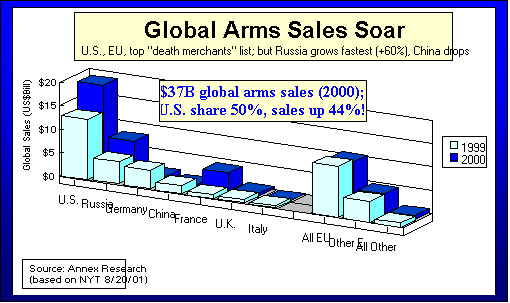
"On the global scene, the U.S. arms manufacturers' 2000 sales surged by 44% since 1999, to $18.6 billion, topping all other international "death merchants," and accounting for exactly half of all global arms sales. Russia was a distant second with $7.7 billion of revenues, but with an even higher (60%) annual increase."
In 2000, after an Algerian was caught coming into the country with explosives, a secret White House review recommended a crackdown on "potential sleeper cells in the United States." That review warned that "the threat of attack remains high" and laid out a plan for fighting terrorism. But most of that plan remained undone.
Car bombing in Spain, January 27, 2000:
Police officials reported unidentified individuals set fire to a
Citroen car dealership in Iturreta, causing extensive damage to
the building and destroying 12 vehicles. The attack bore the hallmark
of the Basque Fatherland and Liberty.
no war on terror!
RUF Attacks on UN Mission Personnel, May 1, 2000:
On May 1 in Makeni, Sierra Leone, Revolutionary United Front militants
kidnapped at least 20 members of the United Nations Assistance Mission
in Sierra Leone and surrounded and opened fire on a UNAMSIL facility,
according to press reports. The militants killed five UN soldiers in
the attack. RUF militants kidnapped 300 UNAMSIL peacekeepers
throughout the country, according to press reports. On May 15 in Foya,
Liberia, the kidnappers released 139 hostages. On May 28, on the
Liberia and Sierra Leone border, armed militants released unharmed the
last of the UN peacekeepers. In Freetown, according to press reports,
armed militants ambushed two military vehicles carrying four journalists.
A Spaniard and one U.S. citizen were killed in a May 25 carnbombing in
Freetown for which the RUF was probably responsible. Suspected RUF rebels
also kidnapped 21 Indian UN peacekeepers in Freetown on June 6. Additional
attacks by RUF on foreign personnel followed.
Diplomatic Assassination in Greece, June 8, 2000:
In Athens, Greece, two unidentified gunmen killed British Defense Attache
Stephen Saunders in an ambush. The Revolutionary Organization 17 November
claimed responsibility.
ELN Kidnpapping, June 27, 2000:
In Bogota, Colombia, ELN militants kidnapped a 5-year-old U.S. citizen
and his Colombian mother, demanding an undisclosed ransom.
Kidnappings in Kyrgyzstan, August 12, 2000:
In the Kara-Su Valley, the Islamic Movement of Uzbekistan took four U.S.
citizens hostage. The Americans escaped on August 12.
Church Bombing in Tajikistan, October 1, 2000:
|
